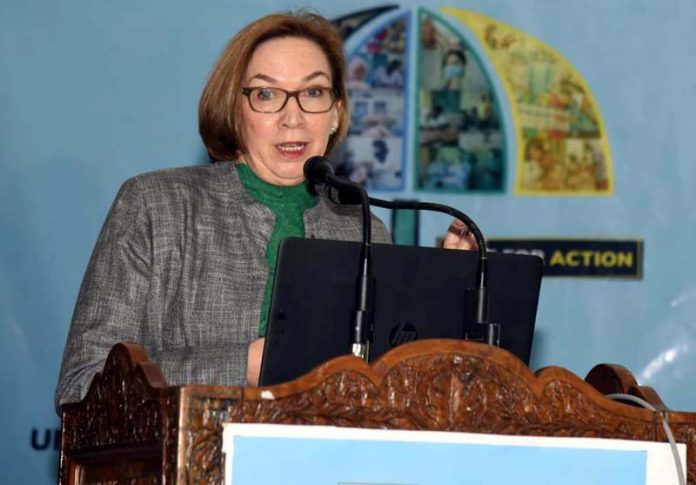India leads global push for alternative systems: Dr Hilde
Irfan Tramboo
SRINAGAR, Dec 12: The J&K Government is providing healthcare benefits to nearly 1,200 people daily under the Ayushman Bharat-Pradhan Mantri Jan Arogya Yojana (AB-PMJAY)-Sehat Scheme across the UT, preventing out-of-pocket expenditures for the masses.
Details about the Government’s flagship scheme in J&K were shared by Bhupinder Kumar, Secretary of the Health & Medical Education (H&ME) Department, during a function at GMC, Srinagar, on the occasion of ‘Universal Health Coverage Day.’
The Secretary stated, “1,200 individuals benefit daily, equivalent to approximately Rs 2 crore worth of treatment, preventing catastrophic expenditures.”
He mentioned that J&K is among the few Union Territories and States providing health cover of Rs 5 lakh to every household annually, resulting in improved access, empowerment of women, and enhanced accessibility through the integration of private health institutions across J&K.
Bhupinder highlighted that the J&K Government continues to allocate one of the highest per capita budgets for health systems.
This ongoing investment in health systems and human resources, he said, has led to improvements in vital healthcare indicators in J&K.
The event, organized by the Department of Community Medicine in collaboration with the World Health Organization (WHO), witnessed the presence of Dr. Hilde De Graeve, Team Lead for Health Systems in India, who also later addressed the gathering.
Regarding furthering healthcare access in J&K, the Secretary noted that the UT has 4,000 health institutions, with a specific focus on enhancing access to healthcare over time. He mentioned that the level of services at primary and sub-centers has witnessed upgrades.
Addressing infrastructure, the Secretary mentioned that J&K has implemented several interventions, with the establishment of seven new Medical Colleges and two upcoming AIIMS, along with two Cancer Hospitals.
Concerning mental health in J&K, Bhupinder highlighted the role of Tele-MANAS, noting that the UT ranks among the top three states in the country in terms of performance.
“There is a significant gap in mental healthcare, and under Tele-MANAS, we have sought to make a difference. There is a need for more focused attention on improving access to mental healthcare, and we must strengthen mental health programs in the districts.”
On the occasion, Dr. Hilde De Graeve delivered a keynote lecture in which she discussed the work done under various programs across the country as well as J&K to achieve the SDG targets.
She said that India is set to eliminate measles and rubella, noting the effective focus on maternity health by J&K. “J&K has achieved the SDG target on Neonatal Mortality Rate, which stands at 9.8 versus 24.9 in the rest of India,” she said.
While mentioning Ayushman Bharat Digital Mission (ABDM) in India, Dr. Hilde pitched for alternative systems of medicine, which, she said, work effectively, noting that on the global level, India is leading the agenda.


